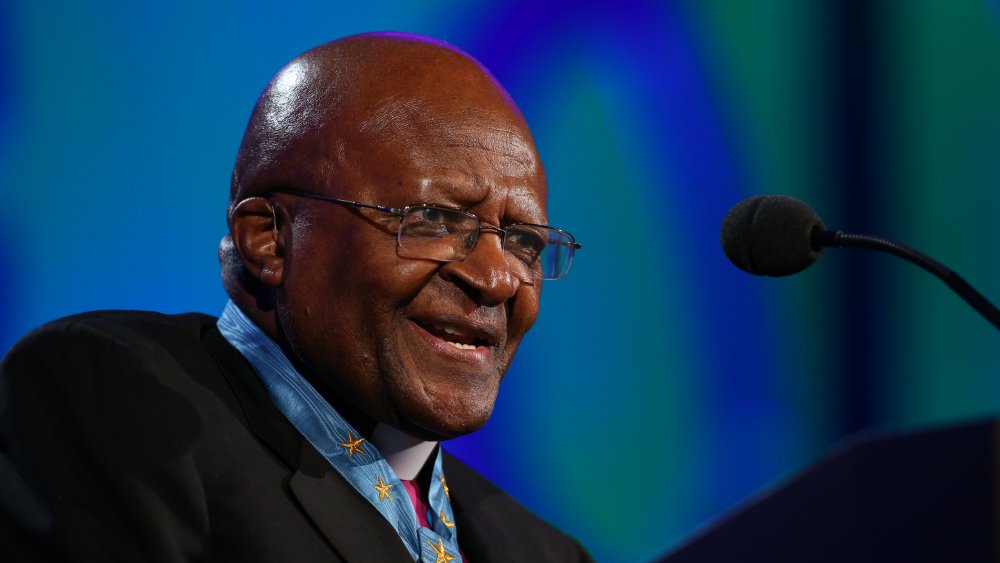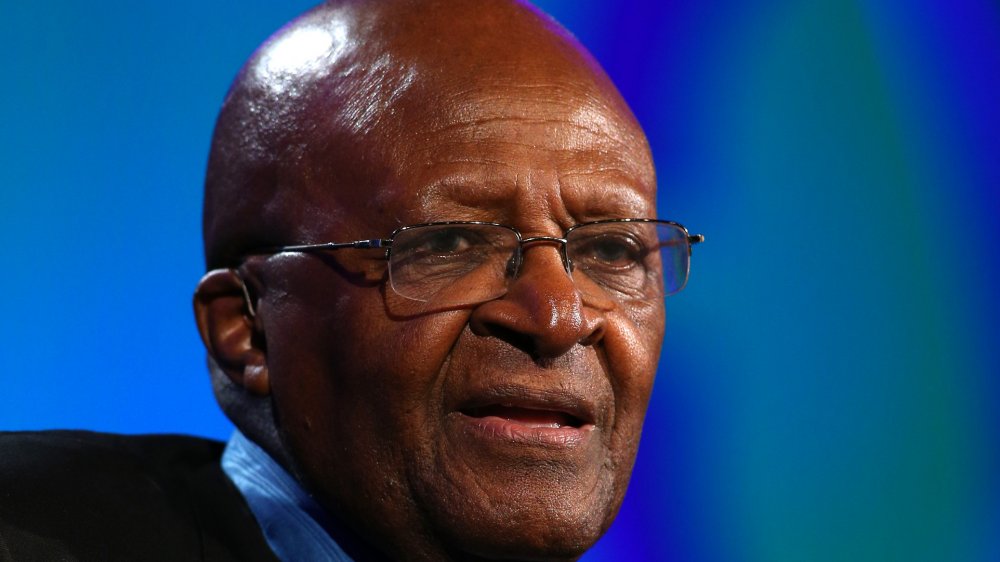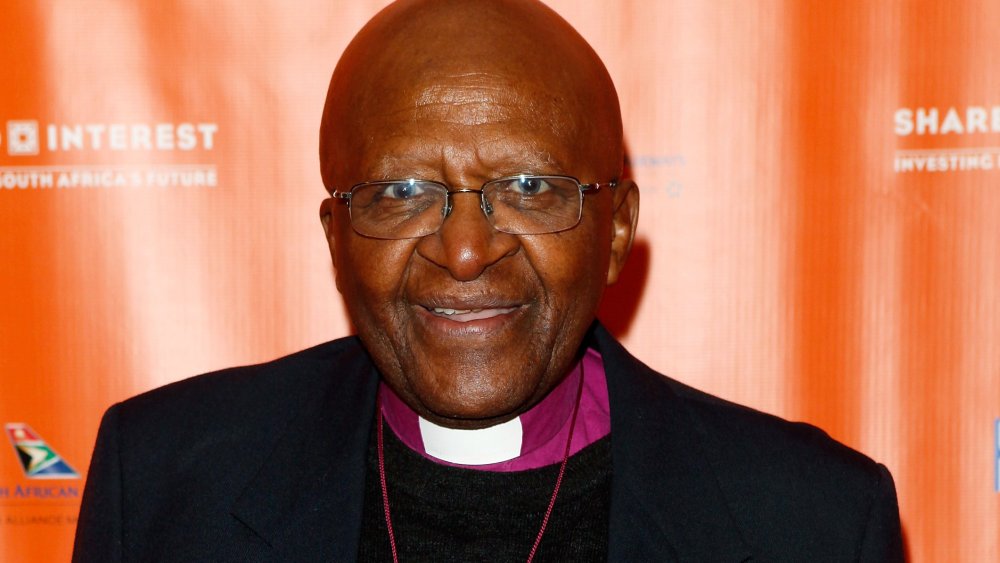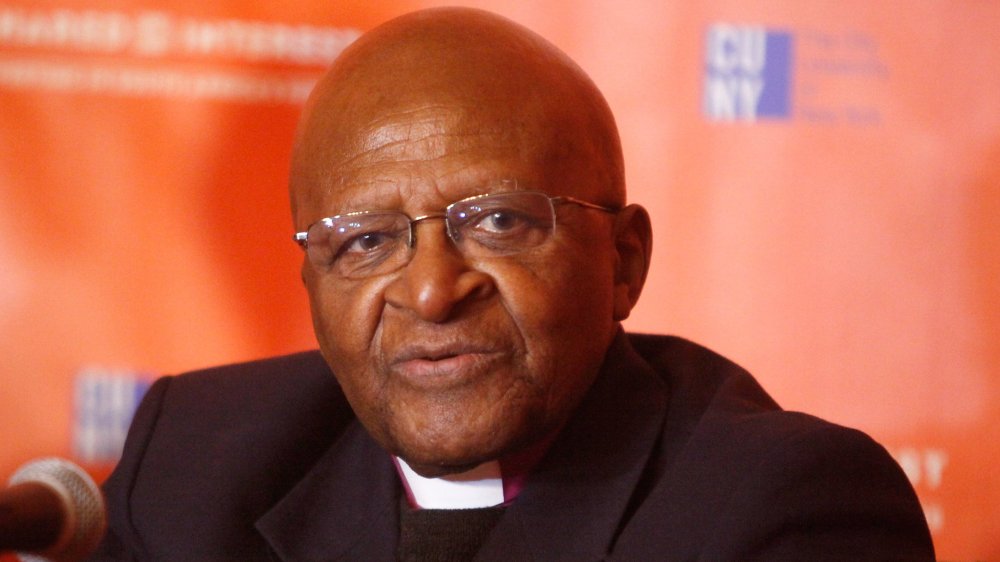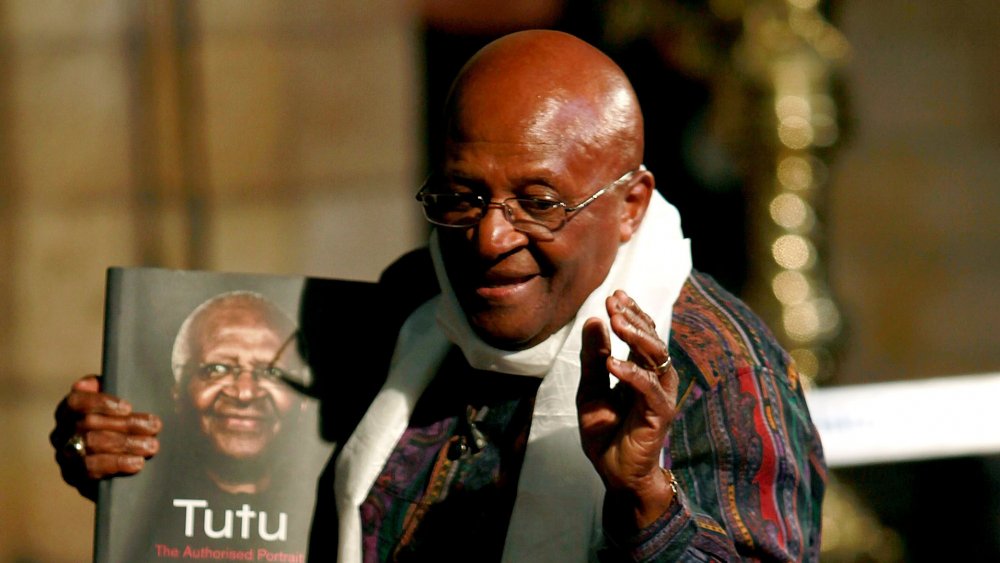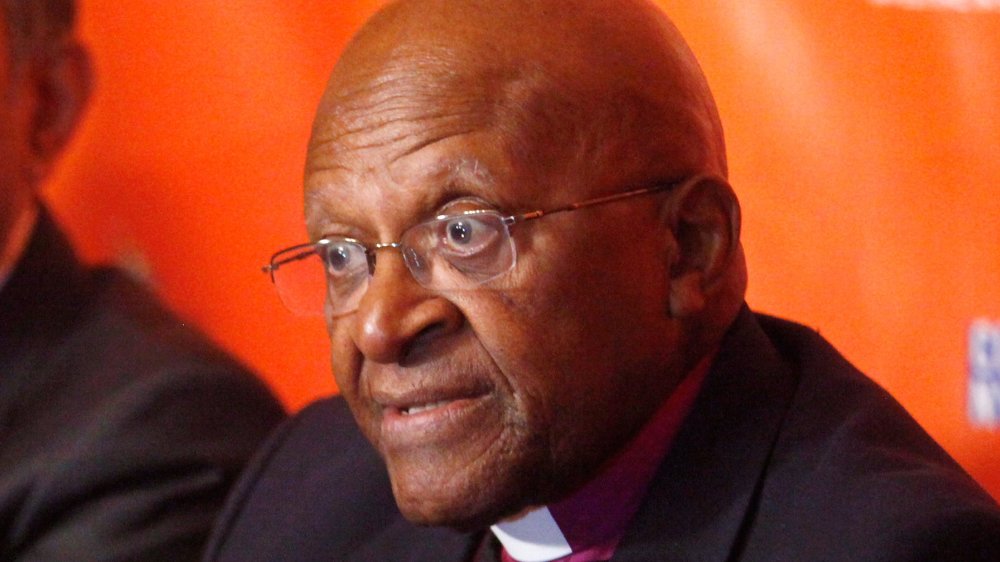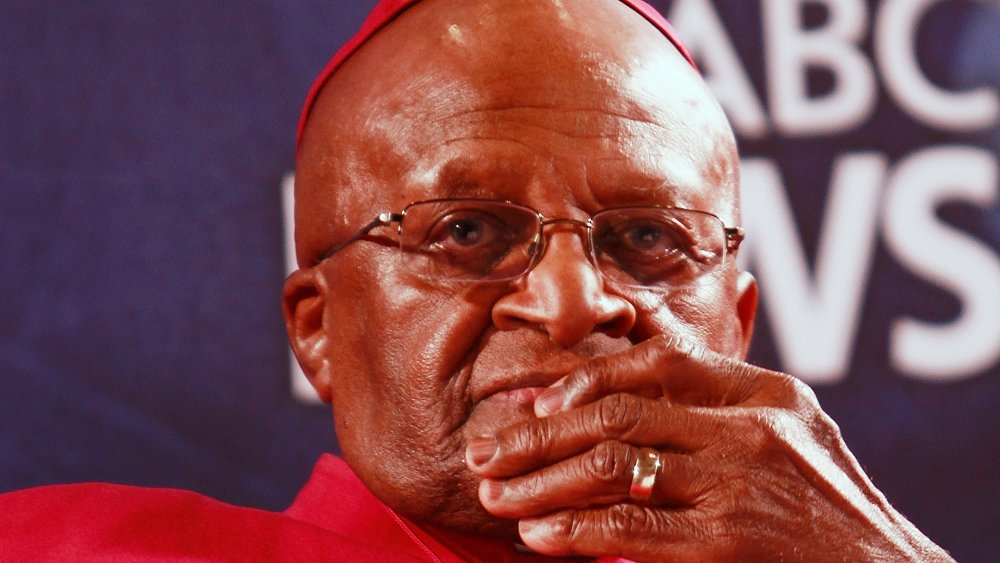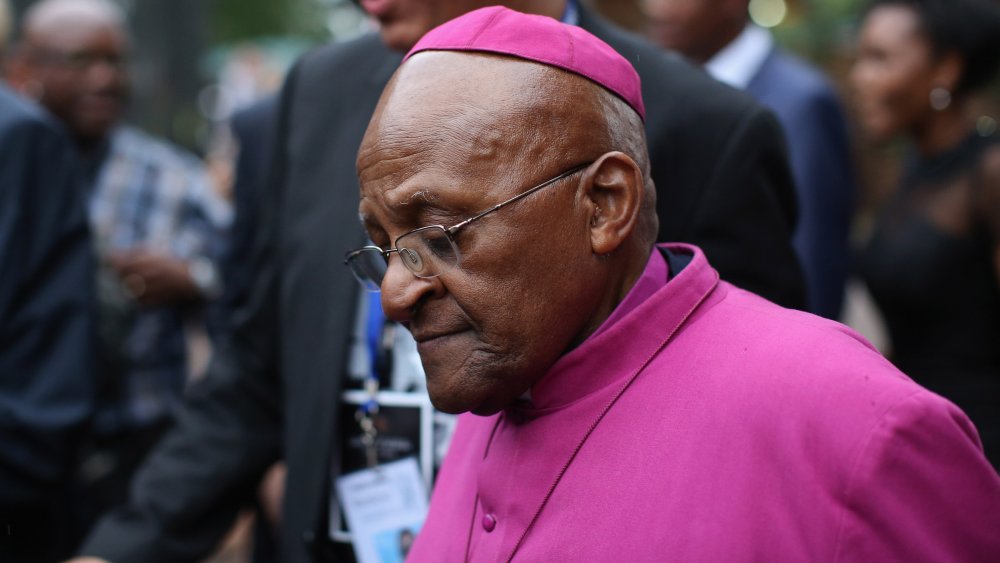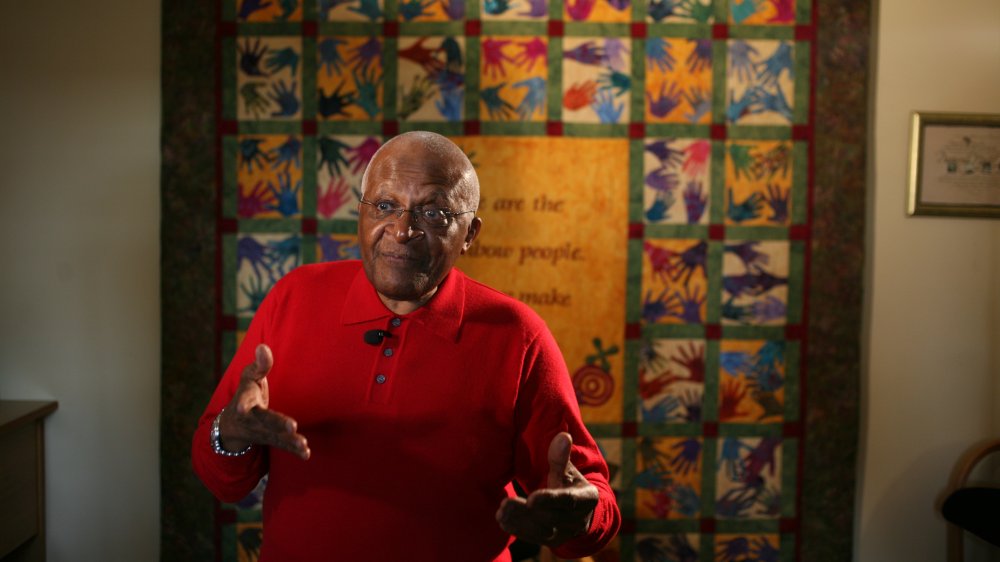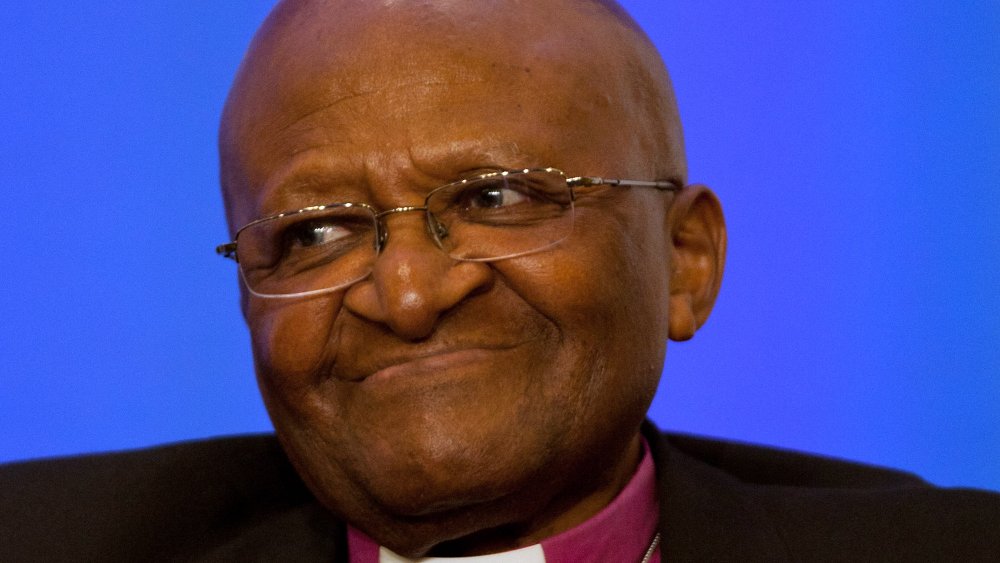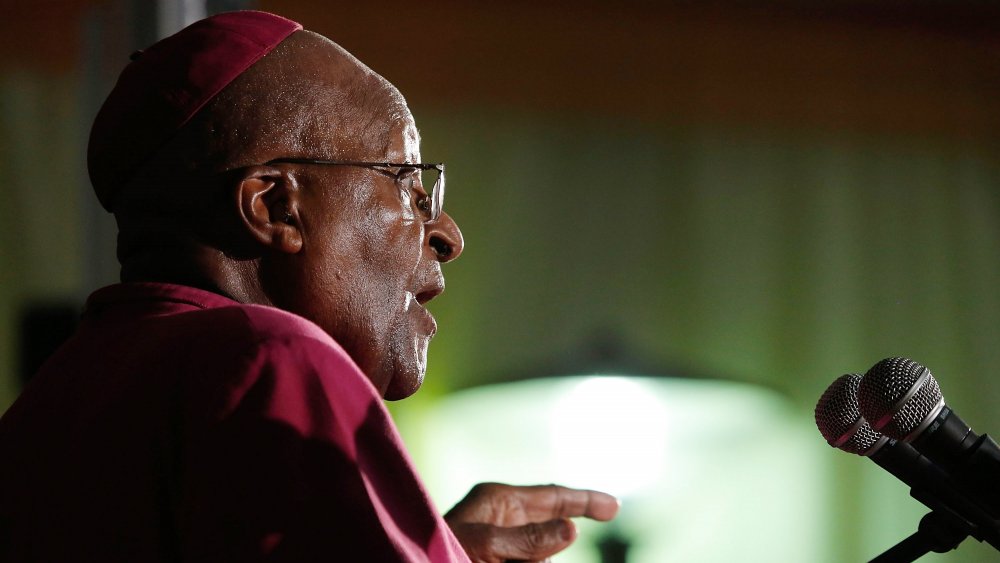The Tragic Truth About Desmond Tutu
South African cleric Desmond Mpilo Tutu rose to public fame for his work against apartheid. He has held several titles throughout his career, including the bishop of Johannesburg and the archbishop of Cape Town. A passionate activist, he campaigned for Black rights in South Africa while lending his voice to several international causes, including speaking out against homophobia, the Israel-Palestine conflict, and human rights issues in war-torn Iraq.
Despite coming from a humble background, Tutu left no stone unturned in his effort to change the course of his life and pursue his dreams. He became globally recognized figure, known for his unrelenting stance on nonviolence. Despite attracting criticism from religious officials due to his views on topics like homosexuality, Tutu was widely hailed as a crucial leader for relentlessly fighting apartheid in South Africa despite facing a plethora of obstacles along the way.
The late clergyman was honored with the Nobel Prize in 1984 for his work against apartheid and was considered a respectable voice when it comes to many issues. However, Desmond Tutu's life was far from rosy and was filled with countless setbacks. Here's a look at the activist's lesser-known stories and anecdotes.
Desmond Tutu's childhood was rough
Desmond Tutu did not come from riches or a privileged background. In John Allen's 2006 book, Desmond Tutu: Rabble-rouser for Peace, the Authorized Biography, the priest was described as belonging to a family that simply got by. Tutu explained, "Although we weren't affluent, we were not destitute either." While his elder sister, Slyvia Funeka, lovingly referred to him as "Mpilo" ("life"), most of his family simply named him "boy." As a kid, Tutu experienced his fair share of pain and illness: He once sustained major burns that resulted in a hospitalization. He also suffered a bout of polio which led to atrophied hand.
Tutu's family harbored a dark secret: His dad would often beat his mother after a few drinks, something which angered Desmond and made him feel helpless. According to The Guardian, he revealed that whenever he thought about his past, he realized that as a child, he wanted to retaliate against his father and hurt him back.
"There were so many nights when I, as a young boy, had to watch helplessly as my father verbally and physically abused my mother," Tutu reflected. "I can still recall the smell of alcohol, see the fear in my mother's eyes and feel the hopeless despair that comes when we see people we love hurting each other in incomprehensible ways. I would not wish that experience on anyone, especially not a child."
Desmond Tutu had to find ways to support himself
Because Desmond Tutu's family wasn't very well-off, he had to work hard and find ways to support himself. Per John Allen, the priest didn't have a lot of leisure time as a schoolkid. He spent his free time working as a caddie, serving white golfers. He also sold oranges on the side and did what he could to scrape a living.
Tutu also moved in with some of his relatives who lived closer to Johannesburg in a bid to avoid a long, daunting train commute to school. After moving around for a while, he found a spot at a hostel connected to the Church of Christ the King in Johannesburg's Sophiatown. This was a turning point in Tutu's life, though he didn't know it yet. This is where he met his mentor and priest, Trevor Huddleston, for the first time. Huddleston would go on to have a major impact on Desmond Tutu's life.
Health issues delayed Desmond Tutu's education
Desmond Tutu hasn't been lucky in terms of his health. He lost more than an entire academic year recuperating in the hospital when he contracted tuberculosis as a student. According to a piece by One, Tutu's bout of tuberculosis left him very ill but couldn't crush his spirit. He couldn't keep up with everything happening at school, but he didn't stop studying, even reading up on coursework by candlelight when he felt better. He finally got through his matriculation exams in the last half of 1950.
Per Desmond Tutu: A Biography by Steven Gish, Tutu was only 14 when he was first diagnosed. A long, 20-month ordeal left him feeling lonely, afraid, and sad. He went through several scares, such as coughing up blood. Tutu couldn't help wondering whether he was ever going to bounce back. His mentor, Trevor Huddleston, made sure to visit him regularly to ease some of his pain and introduced him to several books during this time. When Desmond Tutu finished his finals at 19, he crossed a major milestone. He was one of a mere 0.5 percent of Africans who made it to university entrance tests at that time, a remarkable achievement, especially considering his long ailment.
Desmond Tutu wanted to pursue medicine
After high school, Desmond Tutu was torn: Should he pursue teaching and make his father happy? Or should he listen to his heart and study medicine like he wanted to? Per Gish's Desmond Tutu: A Biography, Tutu looked up to Dr. Alfred B. Xuma, South Africa's first physician who trained in the West and returned to practice in Johannesburg. Tutu's previous brush with tuberculosis had also made him feel intensely about the illness, and he wished to study it further through research. While he was accepted to the University of the Witwatersrand's medical program, his family didn't have funds to support his dream. There was no financial aid available, either, and Tutu finally weighed his other options and chose teaching. In 1951, he started studying at Bantu Normal College.
His student life was memorable, and Tutu was popular among his peers, particularly known for his sense of humor and his extraordinary grasp of the English language. He graduated in 1954 with a diploma in teaching against the backdrop of apartheid and increasingly restrictive policies in South Africa.
Apartheid policies made Desmond Tutu abandon teaching
In 1953, right before Desmond Tutu finished his studies, the Bantu Education Act was implemented. A broadly discriminatory policy, it encouraged all educational institutions to discriminate against and divide students based on their races, which meant that qualified African students would be denied the chances they deserved. According to the BBC, the act made Tutu reconsider his teaching career.
While Tutu taught for a few years, the rise of apartheid was painfully evident to him. For example, the government supported the demolition of Sophiatown, the suburb that Tutu had lived in and where his mentor's church was located. According to the government, the area was a "black spot." It had white-majority areas around it, and the government wanted it gone. Nearly 60,000 people were forced to leave their homes in Sophiatown and head to spots far away.
Moreover, the Bantu Education Act was clearly aimed at degrading Black students by not allowing them equal access to quality education. This was unacceptable to Desmond Tutu, who, after being a teacher for just three years, decided he couldn't be a part of such a discriminatory system. His wife, Leah, also a teacher, decided to support her husband and quit her job as well in solidarity.
Desmond Tutu decided to become a priest
Desmond Tutu knew that he needed to find another way to support his family. He needed to examine alternative ideas. After a little bit of deliberation, he decided to opt for priesthood, much to his father's disappointment. As explained in Desmond Tutu: A Biography, Tutu's Christian faith was strong, and he saw priesthood as a service that was quite like teaching. Additionally, one of his grandfathers had served as a minster. He was also inspired by his mentor, Father Huddleston.
However, his decision stupefied those close to Desmond. Their thoughts ranged from Tutu losing out on the chance excel as an educator to the idea that the church hadn't been able to fight against apartheid. One of Tutu's friends remarked, "We heard rumors that Desmond had responded to a call to the ministry. Why did he not remain as an English teacher and later become a professor of English?" He added that they had no idea back then, but some of them would eventually choose to follow in their friend's footsteps.
Importantly, apartheid wasn't limited to education and existed within the church, too. In 1957, the government formalized apartheid in churches, dividing believers of different races. Around this time, Tutu was focusing on his studies in theology when the Sharpeville massacre took place. A demonstration by anti-apartheid protesters turned ugly when cops decided to shoot them without warning. The incident left a mark on Tutu.
Desmond Tutu's stint in the U.K. changed him
By 1962, Desmond Tutu and his family had shifted base to London as the priest pursued higher studies at King's College London. Living in a liberal environment had an effect on Tutu. Per Desmond Tutu: A Biography, it was refreshing. Tutu later explained, "It was marvelous. We didn't have to carry our passes anymore and we did not have to look around to see if we could use that bath or that exit," referring to the discriminatory policies Black South Africans faced back home. For example, according to the BBC, apartheid pass books severely restricted and controlled where Black South Africans could work and go in the country.
Tutu also had the opportunity to interact with a white-majority community and tackle his preconceived notions. He worked closely with a white congregation at St. Alban's and realized that the obstacles his white parishioners sought answers for were just like the ones Black people faced. Tutu later said, "I was ministering for the first time on a regular basis to white people as a priest. I don't know what I was expecting but it turned out that they were human beings with the ordinary strengths and foibles, resentments and triumphs, as well as the sins of ordinary human beings." Tutu and his family spent several years in the U.K., returning to South Africa in 1966 after his master's degree in theology was completed.
Desmond Tutu returned to an increasingly divided South Africa
Desmond Tutu and his family returned to a South Africa in chaos. The cleric was heartbroken to see what was unfolding in his homeland. His family found it tricky to adjust to life back in South Africa, and Tutu wrote to a friend about the discriminatory policies at work, including being forced to carry a pass with him at all times and asking for official permission before going to see his parents.
Tutu was also trying to build a life for his family. He spent the next few years in different positions, including one in the Eastern Cape, another in Lesotho in 1970, and a third one in Kent in the U.K. According to The Desmond Tutu Peace Foundation, Tutu moved back to South Africa in 1974 after he accepted a role as the Anglican dean of Johannesburg.
Apartheid was all over South Africa. One of the most notable events around this time was the Soweto Uprising, a protest led by Black schoolchildren against apartheid as well as a policy that had just been announced: that all Black kids would be barred from learning in English and would learn in Afrikaans instead. Antoinette Sithole, who was 15 then, remembered how it felt. "The very same subject that you are struggling with in English, we are going to do them in Afrikaans? This doesn't make sense," she told Time. The clash resulted in the shooting of innocent kids and left Tutu distraught.
Desmond Tutu and his countrymen had a long wait
The Soweto Uprising left Desmond Tutu filled with grief and sorrow. In 1976, he wrote an open letter to Prime Minister John Vorster and didn't mince words as he criticized apartheid. The letter, according to Håkan Thörn's "A New Black Militancy — Before and after the Soweto Uprising," was published by The Guardian as well as The Sunday Tribune. Tutu wrote about the collective suffering of his countrymen: "How long can a people, do you think, bear such blatant injustice and suffering? Much of the white community by and large, with all its prosperity, its privilege, its beautiful homes, its servants, its leisure, is hagridden by a fear and a sense of insecurity. And this will continue to be the case until South Africans of all races are free."
The struggle against apartheid would continue for many years. South Africa finally broke free of it in 1994. However, until that happened, those who spoke up against discrimination were subjected to injustice. Desmond Tutu was not exempt — his passport was seized by the police for an extended period, he risked the possibility of being jailed for urging people to boycott the elections, and he was subjected to threats.
Desmond Tutu has been criticized for his controversial views
After apartheid, Tutu spent a lot of time supporting international causes and being quite vocal about his views. For instance, he was a strong supporter of gay rights and never hesitated to lend his support to the cause. According to a BBC piece, Tutu spoke about how strongly he feels about the cause in 2013. "I would refuse to go to a homophobic heaven. No, I would say sorry, I mean I would much rather go to the other place," Tutu said. "I would not worship a God who is homophobic and that is how deeply I feel about this."
Tutu's critics have tried to stop him. In 2012, they attempted to prevent him from delivering a speech at Gonzaga University in Spokane, Washington, feeling that Desmond Tutu's views on homosexuality contradict Catholic teachings. For his part, the clergyman simply said he was bored of the criticism. "People should be entitled to express their opinions, and I will continue to work hard to support the right of all people around the world to express their opinions," he stated.
Desmond Tutu's family members have let him down
Desmond Tutu has dealt with controversies involving his own family members. For example, in 1989, his eldest son was accused of making a bomb threat at an airport and had to serve jail time. Tutu reflected on his son in an interview with The New York Times. "He's a very gifted person, but you see a little bit how God must feel about us because he has really undermined his own life by his abuse of alcohol," Tutu lamented. "When he's not under the influence, he's incredibly wonderful, he really is, and it makes you weep to see how he then is almost intent on destroying himself."
In 2012, Desmond Tutu received another blow. Tutu and his wife had to file charges against their granddaughter for damaging property. She shot back with a defensive tweet writing, "We are waging war. Truths will be revealed." A few hours later, she wrote again on Twitter, "I am regrouping but @TheDesmondTutu & granny Leah I will be handing myself in on Friday. # TututrialbyMedia."
Desmond Tutu has faced many health concerns
Desmond Tutu's health has been uncertain for several years. According to The Guardian, he's undergone surgery for prostate cancer and has also fought off against several infections, visiting the hospital frequently to safeguard his health and receive treatment. His suffering has even made him rethink his views on euthanasia.
He expressed his thoughts in a piece published in The Washington Post in 2016. "With my life closer to its end than its beginning, I wish to help give people dignity in dying," he stated. Just as I have argued firmly for compassion and fairness in life, I believe that terminally ill people should be treated with the same compassion and fairness when it comes to their deaths." Tutu has also clearly stated that he would not like to be kept alive no matter what. "I have prepared for my death and have made it clear that I do not wish to be kept alive at all costs," he said. "I hope I am treated with compassion and allowed to pass on to the next phase of life's journey in the manner of my choice."
